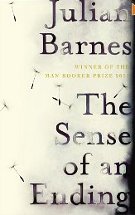The sense of an ending by Julian Barnes

Jonathan Cape, 2011. ISBN 9780224094153.
The Sense of an Ending won the 2011 Booker prize for its author. The
main character, Anthony, finds himself in later life forced to consider
the accuracy of memory, the nature of history and the value of life
itself. He remembers himself and his two friends delighting in
intellectual games, the pat phrase and the glib assertions that came
with senior history studies at school in the sixties. However, Adrian,
the acknowledged brilliant new student, challenges their assumptions.
History, he says, is the point where the 'imperfections of memory meet
the inadequacies of documentation'. The three are shocked by a
classmate's suicide, seemingly because his girlfriend falls pregnant.
Adrian tells the others that suicide is the only true philosophical
question. Some years later, after graduating with a First from
Cambridge, Adrian himself commits suicide. Was this connected to
Adrian's girlfriend, Veronica, who had previously been Anthony's
girlfriend for some time? Decades after this event, Anthony, who has
lived an unexciting life, is divorced and living alone, is forced to
remember the events of the time when Veronica's mother leaves him a sum
of money and Adrian's diary. Mystified, Adrian contacts Veronica who
won't hand over the diary but does give him a copy of a vitriolic
letter that he wrote to Adrian about his relationship with Veronica.
Anthony is appalled at his own venom, of which he has no memory, and he
is still denied the documentation of the diary. He is further mystified
when Veronica, without explanation, pugnaciously shows him a group of
disabled people. With the help of a carer and the only scrap of diary
that Veronica gives him, he eventually arrives at some understanding of
what happened to Adrian many years ago, and why he made the choice that
he did. Anthony, who has always seen himself as settled and peaceable,
realizes that there is no room for complacency in life. The novel is
about memory and responsibility, guilt and remorse. While the ending is
not totally convincing the themes are powerfully explored.
Jenny Hamilton